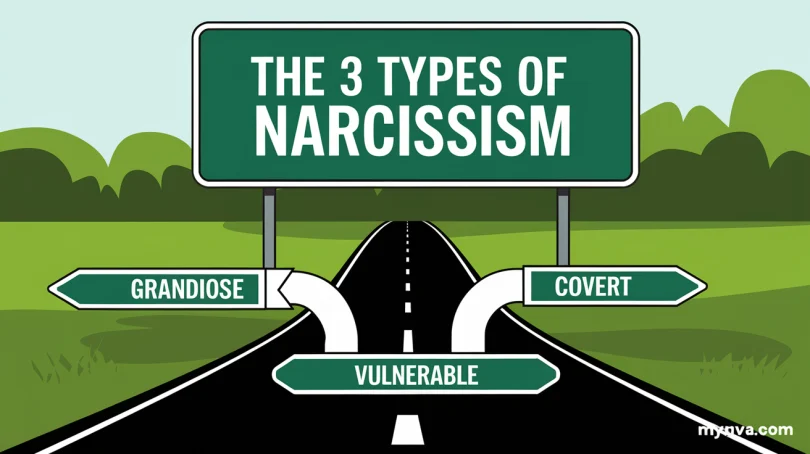Today, I want to talk about three types of narcissism. There are several different types, but in child custody and family law cases, three are more common. I want to discuss these, what each of them entails, and the differences between them. The way you deal with each type is slightly different, depending on which one you’re facing.
Understanding the basis for their behavior and what they’re trying to achieve can sometimes allow you to give them what they want in a way that’s more palatable for you. This can help resolve issues, settle your case, or manage interactions more effectively.
The three most common types I see in family law are covert, overt, and malignant. Let’s break each one down.
1. Covert Narcissism: The Mask of Normalcy
A covert narcissist is exactly what the term suggests, like covert operations, undercover. They harbor insecurities, fears, and vulnerabilities beneath the surface. The exterior they present, or the “mask” they wear, is an effort to appear normal to others. This type is very common.
Many times, people say, “You don’t understand my narcissistic ex is so good at schmoozing people and appearing kind, making everything seem great.” But behind closed doors, their fears, insecurities, and abusive behaviors emerge.
I’m not a therapist, but if I had to peg the type of narcissist I dealt with in my relationships, it would be the covert type. People would say to me, “Wow, your husband’s so nice!” not my late husband, but my ex, just to clarify for those who know I’ve been married twice.
They’d say, “He’s so nice,” but he was a different person behind closed doors. That mask would come off. It’s almost like a dual personality or split personality, one person in public, another in private.
Dealing with Covert Narcissists
Covert narcissists care deeply about what others think of them. This can be an advantage. If you have strong documentation, evidence, or can call them out on specific lies, especially in court or formal settings, you can box them in.
People fear this type because they’re often charming and can “shoot from the hip” to win others over. But when confronted with facts, like “2 + 2 equals 4,” and they try to argue it’s 3, no amount of charm can change the truth. Presenting undeniable evidence disrupts their primary survival mechanism, charm, and forces them to confront their lies.
2. Overt Narcissism: The Classic Arrogance
An overt narcissist is what we classically think of when we hear “narcissism.” These individuals come across as conceited, full of themselves, or self-righteous. They carry an indignant, “I’m all that” attitude all the time, whether at home, in public, or in any setting. In moments of weakness, they might admit to fears or insecurities because ultimately, the same drivers of fear and inadequacy fuel their behavior.
However, they handle it differently from covert narcissists. While covert narcissists want everyone to like them and see them as a “good guy,” overt narcissists project, “I’m all that, and don’t you forget it,” consistently, no matter who they’re dealing with.
Dealing with Overt Narcissists
With overt narcissists, stroking their ego can be very effective. Validating them, thanking them, or pointing out something they did well can soften their demeanor. I sometimes suggest to clients, “In the middle of a message, thank them for something or highlight a positive action.”
People often balk at this, saying, “That sounds miserable!” I get it. Normally, I advocate for cut-and-dry communication focused on logistical issues. But when negotiating or trying to resolve a case, understanding their need for validation can help. I’ve seen it work more than once to move cases toward resolution.
3. Malignant Narcissism: The Scorched Earth Approach
Malignant narcissism is probably the worst of the three, though, in my experience, it’s the least common in custody and family law cases. This isn’t based on statistical sampling, just my observations.
A malignant narcissist is out to destroy you at all costs. They don’t care if they destroy themselves, burn bridges, or ruin everything. They have no regard for others’ opinions or consequences.
The root of their behavior is the same as the other types: fear, insecurity, inadequacy, and unresolved childhood issues. But their coping mechanism is extreme. They adopt a “scorched earth” policy, burning everything down without hesitation.
Dealing with Malignant Narcissists
Malignant narcissists are the most difficult to handle. They don’t care about others’ perceptions, so appealing to their ego or desire for approval doesn’t work. The only effective strategy is to establish strong, immovable boundaries. Stay out of their “firing zone” and protect yourself.
Cooperation or improved communication over time is unlikely with this type. They’ll burn everything down without remorse, so negotiation is often futile. In these cases, you may need to rely on the court system and maintain strict boundaries to avoid chaos.
Why Understanding These Types Matters
The source of all narcissistic behaviors, fear, insecurity, and inadequacy is similar, but each type copes differently, producing distinct effects. This is why dealing with narcissists requires tailored strategies. What works for one type may not work for another. For example:
- Covert narcissists respond to evidence and exposure because they fear losing their “good guy” image.
- Overt narcissists respond to ego-stroking and validation because they crave admiration.
- Malignant narcissists require strict boundaries because they’re indifferent to others’ opinions or consequences.
When seeking help, you need someone who can guide you through this process and tailor strategies to your specific situation. Foundational principles apply, but the nuances of each narcissist’s behavior demand customized approaches.
Testing and Adapting Your Approach
You may not immediately know which type of narcissist you’re dealing with, but you can test different strategies:
- Try including a compliment in a message. Does it change their response?
- Confront them with evidence. Does it shift their behavior?
- If nothing works, you might be dealing with a malignant narcissist. In that case, pull back, enforce strong boundaries, and prepare to handle matters through the court.
Figuring out these dynamics is incredibly helpful and provides strategies for managing these challenging personalities.






